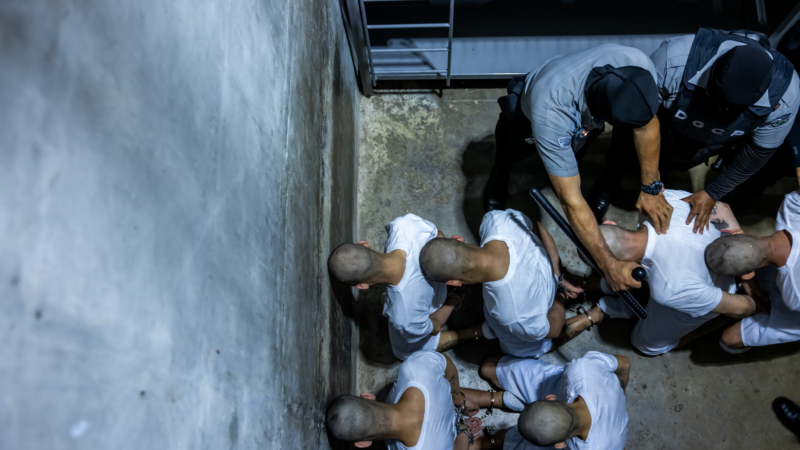Advocates say flawed ‘checklist’ targets Venezuelans for deportation under archaic wartime act
Immigrant-rights advocates say the U.S. government is using a checklist of “unreliable indicators” to decide whether Venezuelan men are members of the gang Tren de Aragua and subject to removal under the Alien Enemies Act, a rarely-used wartime law.
The checklist was revealed Friday in court filings in a case brought by the American Civil Liberties Union, which challenges the Trump administration’s use of the Alien Enemies Act to remove 137 Venezuelan suspected gang members to a maximum security prison in El Salvador.
The ACLU, in a request for a preliminary injunction, cited several examples of Venezuelan men sent to El Salvador, who were accused of being gang members because of their tattoos. They include a professional soccer player with a tattoo of a soccer ball with a crown, similar to the Real Madrid Football Club logo.
Tren de Aragua is a gang recently designated by the Trump administration as a foreign terrorist organization.
However, many family members of the accused, as well as their attorneys, deny their loved ones have any affiliation with the gang.
“The government’s checklist suggests that tattoos and other unreliable indicators are playing an enormous role in Venezuelan men ending up in a brutal Salvadoran prison, perhaps for the rest of their lives,” Lee Gelernt, the deputy director of the ACLU Immigrants’ Rights Project, told NPR Monday. “Individuals must have a right to contest their designation as gang members, even if this wartime authority can be used during peacetime.”
Karoline Leavitt, the White House press secretary, told reporters Monday that “there is a litany of criteria that (DHS) use to ensure that these individuals qualify as foreign terrorists and to ensure that they qualify for deportation.”
What court filings revealed
One of the documents contained in Friday’s filing titled Alien Enemies Act: Alien Enemy Validation Guide, provides a checklist of 20 observations divided into six categories. The categories include judicial outcomes, criminal conduct and information and symbolism.
The checklist assigns point totals to different categories for each immigrant, including “subject has tattoos denoting membership/loyalty to TDA” and subject “…displays insignia, logos, notations, drawings, or dress known to indicate allegiance to TDA.”
Each observation has an assigned value ranging from two points, up to 10 points. According to the document, migrants who have a total score of eight points or higher “are validated as members of TDA,” and will be issued a “Notice and Warrant of Apprehension and Removal Under the Alien Enemies Act.”
“Aliens scoring 6 or 7 points may be validated as members of TDA; you should consult with a supervisor and (Office of the Principal Legal Advisor), reviewing the totality of the facts, before making that determination,” the checklist instructions state.
Homeland Security Investigations, and local law enforcement agencies such as the Texas Department of Public Safety, have said Tren de Aragua members have tattoos showing a variety of images, including AK-47s, trains, clocks, crowns, stars, and the Jumpman logo, used to promote the Air Jordan basketball sneakers.
But Ronna Rísquez, a Venezuelan investigative journalist who has written extensively about Tren de Aragua, says tattoos are an unreliable and highly subjective way to identify members of the gang.
“Tattoos aren’t an identifier for Tren De Aragua,” Rísquez told NPR. “Maybe there’s a Tren de Aragua member who has that tattoo, but that’s not enough to identify them as Tren de Aragua.”
She said more investigation is needed before accusing someone of being part of the gang.
“These are tattoos that have become trendy among young Venezuelans and Latin Americans,” Rísquez said.
One popular tattoo is the phrase ‘Real hasta la muerte,’ or ‘Real until I die.’ According to federal and local law enforcement, that phrase is a symbol used by Tren de Aragua. But it was coined by Puerto Rican reggaeton singer Anuel AA.
“Many young people have gotten that tattoo showing how big a fanatic they are of the singer,” Rísquez said.

Families allege tattoos landed loved ones in El Salvador
Earlier this month, the Trump administration sent more than 230 Venezuelan men to the Centro de Confinamiento del Terrorismo, or CECOT, in El Salvador under the Alien Enemies Act — 137 of them under the Alien Enemies Act, and 101 under regular deportation procedures.
But the administration has provided contradictory information: although high-ranking officials continue to say that all of the 238 Venezuelan men were members of Tren de Aragua, in court documents, one ICE official conceded that some of the men didn’t have criminal records. The lack of “specific information,” the official declared, “highlights the risk they pose.”
27-year-old Josue Basto Lizcano is one of the men the U.S. sent to El Salvador. He tried to enter the U.S. on September 7, 2024 via a CBP app that Trump shuttered in January.
But Basto was detained that day, and was never released, said his sister Yesika Basto.
She told NPR that after the November presidential election, his brother “told us immigration agents were accusing him of being Tren de Aragua.”
“He’s not part of any gang,” Yesika Basto said, adding that her brother doesn’t have a criminal record in Venezuela or Colombia, the two places he’s lived. “He can’t have any criminal record in the U.S. because he’s never been free.”
Her brother has multiple tattoos, including a clock that marks the time of his son’s birth, a rose, and stars.
She described her brother as someone who loves adventure. In Colombia he worked for a tourism company as a driver. He also helped in the family’s cabinetmaking business.
“My brother was discriminated against because of his tattoos,” Yesika Basto said. “I know that many people have committed crimes and made mistakes, but we are not all the same.”
‘My role was making movies that mattered,’ says Jodie Foster, as ‘Taxi Driver’ turns 50
Foster was just 12 years old when she starred in the 1976 film. "What luck to have been part of that, our golden age of cinema in the '70s," she says. Her latest film is Vie Privée (A Private Life).
Supreme Court appears likely to uphold state bans on transgender athletes
To date, 27 states have enacted laws barring transgender participation in sports.
Keep an eye out for these new books from big names in January
The new year begins with a host of promising titles from George Saunders, Julian Barnes, Jennette McCurdy, Karl Ove Knausgaard and more. Here's a look ahead at what's publishing this month.
Want to play a Tiny Desk concert? The 2026 Contest is now open for entries
The 2026 Tiny Desk Contest, our annual search for the next great undiscovered artist, is now officially open for entries.
Scott Adams, the controversial cartoonist behind ‘Dilbert,’ dies at 68
Adams announced in May that he was dying of metastatic prostate cancer. Thousands of newspapers carried his strip satirizing office culture from the '90s until a controversy in 2023.
As Iran’s protests continue, Israelis and Palestinians watch closely
There is broad support for the protests among Israeli officials, but Palestinians say they hope the Iranian regime stays in place and the protests die down soon.








